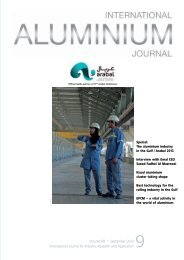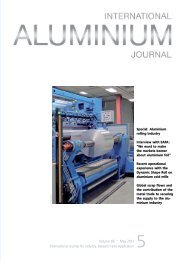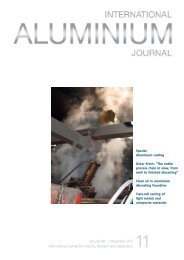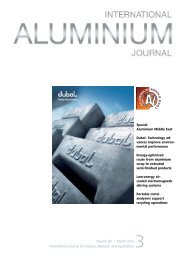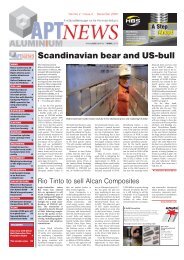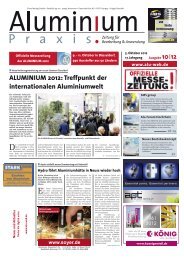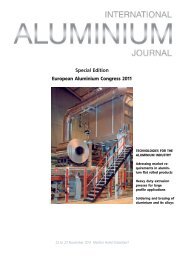SMS Siemag AG - Alu-web.de
SMS Siemag AG - Alu-web.de
SMS Siemag AG - Alu-web.de
Create successful ePaper yourself
Turn your PDF publications into a flip-book with our unique Google optimized e-Paper software.
TeChNoLogY<br />
Advanced casting research to boost auto industry production<br />
Metal casting process innovations will enable<br />
new generations of high quality car<br />
parts to be produced from recycled scrap<br />
metal and <strong>de</strong>rive more savings in natural<br />
resources.<br />
Further advances in solidification metallurgy related<br />
to micro structures will boost casting integrity<br />
and extend lightweighting options<br />
Together with the careful control of metallurgical<br />
process parameters and as-cast micro<br />
structures, optimised conditioning and purification<br />
of the molten metal are vital consi<strong>de</strong>rations<br />
in casting aluminium, particularly from<br />
recycled metal. The key objective is to ensure<br />
the quality and integrity of foundry products<br />
in a variety of applications, not least in the<br />
automotive sector. Now, car makers in Britain<br />
are likely to be the first to benefit from what<br />
is hailed as revolutionary new metal casting<br />
techniques <strong>de</strong>veloped at Brunel University<br />
in London, through a UK Government-supported<br />
programme to <strong>de</strong>velop laboratory<br />
discoveries for exploitation in industrial-scale<br />
applications.<br />
The £14 million Advanced Metal Casting<br />
Centre (AMCC) at Brunel will bridge the gap<br />
between fundamental research and full-scale<br />
industrial trials. Along with the University, the<br />
<strong>de</strong>velopment is jointly fun<strong>de</strong>d by the Engineering<br />
and Physical Sciences Research Council,<br />
the aluminium automotive sheet and extrusions<br />
solutions provi<strong>de</strong>r Constellium, and the<br />
luxury car manufacturer Jaguar Land Rover.<br />
The new facility will draw on the work carried<br />
out by Professor Zhongyun Fan and his<br />
university team at the Brunel Centre for Advanced<br />
Solidification Technology to improve<br />
the recyclability of metals. “Our long term<br />
aim,” he says, “is to reduce the amount of new<br />
metal mined from the ground to a minimum,<br />
by finding ways to make high quality parts and<br />
materials from metal that has already been<br />
used at least once.”<br />
“For example, in the UK alone we send<br />
New AMCC at Brunel University – research work<br />
programmes at the leading edge ...<br />
around 300,000 tonnes of aluminium to landfill<br />
every year. That is a direct economic loss<br />
of nearly £800 million and represents a further<br />
loss of around 11 million barrels of oil, representing<br />
the energy used to make that amount<br />
of aluminium. Clearly, there are many environmental<br />
and economic benefits to be gained<br />
from reusing that material.”<br />
One project that will be pursued in the<br />
AMCC is the replacement of the hundreds of<br />
registered aluminium alloys currently in commercial<br />
use with just over ten highly versatile<br />
alloys that can be used over and over again.<br />
Another research programme is aimed at<br />
<strong>de</strong>veloping a set of very efficient techniques<br />
for purifying and conditioning liquid metal to<br />
support reliable industrial processes, that can<br />
be used to make high quality castings for cars<br />
and other applications. “Every failed casting<br />
represents a huge waste of energy, time and<br />
money,” says Professor Fan. “We know that<br />
our new techniques can reliably create first<br />
class components from recycled metal. Our<br />
challenge now is to scale these methods up<br />
for commercial use and to show that they can<br />
reduce cost, improve quality, and conserve<br />
natural resources.”<br />
The basis for these new techniques generated<br />
by the research work is essentially a<br />
change in emphasis for the study of metal solidification.<br />
The rate of cooling during metal<br />
solidification has a key influence on gas porosity<br />
and as-cast micro structure, including the<br />
morphology of inclusions, which help to <strong>de</strong>fine<br />
the subsequent mechanical and surface properties,<br />
performance and integrity of the alloy<br />
casting. The traditional approach has been to<br />
look at the process of crystal growth as metal<br />
cools, but this has been replaced with a focus<br />
on nucleation, the effect that microscopic<br />
impurities in the metal have on the solidification<br />
process. By controlling the interface at<br />
a microscopic level between the liquid metal<br />
and the impurity particles, the characteristics<br />
of the solidified metal casting can be manipulated<br />
to produce the required properties. The<br />
aim is to produce materials and components<br />
with fine and uniform micro structure, uniform<br />
chemical composition and reduced or<br />
eliminated cast <strong>de</strong>fects.<br />
The AMCC will be housed in a 1,000 m 3<br />
laboratory on Brunel’s campus in west London,<br />
with industrial partners, including Constellium,<br />
providing funding as well sponsoring<br />
Research Fellows and providing technical support.<br />
The centre will initially serve the automotive<br />
industry, but the longer term aim is<br />
to extend its knowledge to other engineering<br />
sectors.<br />
UK Minister for Universities and Science<br />
David Willetts says: “For Britain to get ahead<br />
in the global race we have to back emerging<br />
technologies and ensure our universities have<br />
... of aluminium casting technology<br />
the latest equipment. This capital investment<br />
will help scientists make new discoveries and<br />
take their research through to commercial<br />
success. It will drive growth and support the<br />
Government’s industrial strategy.”<br />
Ken Stanford, contributing editor<br />
ALUMINIUM · 11/2013 59



